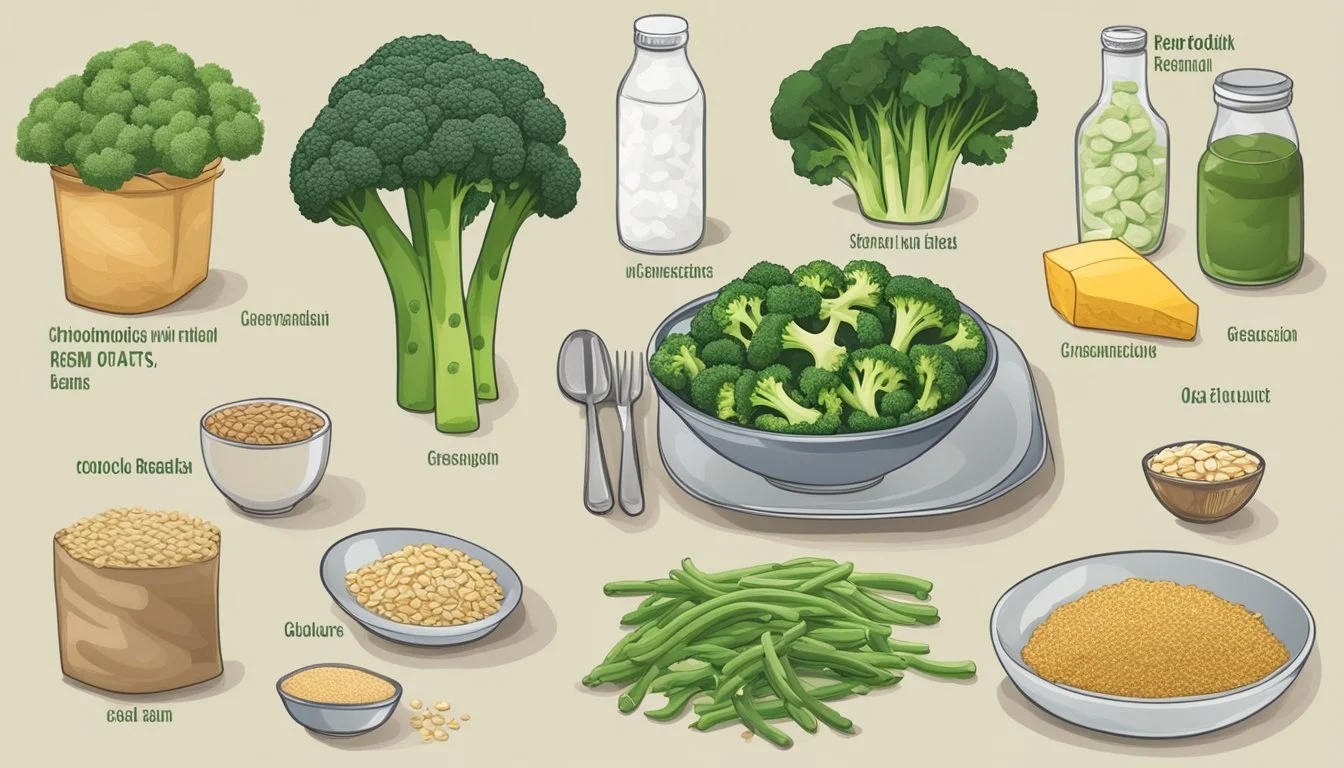8 Foods High in Chromium for Better Blood Sugar Control
Boost Your Nutrient Intake
Chromium is an essential trace mineral that plays a key role in the metabolism of carbohydrates and fats. Unlike some nutrients, the body requires only tiny amounts of chromium, yet it is crucial for helping regulate blood sugar levels and enhancing insulin function.
Knowing which foods are high in chromium can greatly assist individuals in ensuring their diet supports adequate intake of this essential mineral. While the risk of deficiency is relatively low, maintaining a balanced diet that includes chromium-rich foods can provide substantial health benefits.
1) Broccoli
Broccoli is a well-known vegetable that provides a significant amount of chromium. A half-cup serving of broccoli offers around 11 micrograms of chromium.
Broccoli can be easily incorporated into meals. It can be served steamed, roasted, or raw. The versatility of broccoli allows it to be paired with various dips such as hummus or yogurt-based sauces.
Including broccoli in a diet is beneficial for acquiring chromium. Its nutrient content is consistent, making it a reliable source for meeting daily chromium needs. High in vitamins and minerals, broccoli is a nutritious addition to any diet.
2) Grape Juice
Grape juice stands out as a notable source of chromium, a trace mineral essential for various metabolic processes. A single cup (240 mL) of grape juice contains approximately 7.5 micrograms of chromium, meeting a significant portion of the daily value.
This juice is not only rich in chromium but also in plant-based compounds like polyphenols. These compounds contribute to the overall health benefits of grape juice, making it a valuable addition to a balanced diet.
It's worth noting that the chromium content in grape juice can vary depending on factors such as grape variety and growing conditions. Despite this variability, grape juice remains one of the richest fruit-based sources of this essential mineral.
3) Organic Turkey Breast
Organic turkey breast is a notable source of chromium. A 3-ounce (85-gram) serving provides approximately 1.7 mcg of chromium, which is about 5% of the daily value. This makes it a valuable addition to a diet focused on meeting nutritional requirements.
In addition to chromium, organic turkey breast is a lean protein source. It contains essential amino acids, vitamins, and minerals like B vitamins and zinc. These nutrients support various bodily functions, including metabolism and immune health.
Choosing organic turkey breast can also reduce exposure to hormones and antibiotics often used in conventional poultry farming. This choice promotes not only personal health but also environmentally sustainable farming practices.
Overall, incorporating organic turkey breast into meals can help individuals achieve their daily chromium intake goals while providing a range of other nutritional benefits. Combine it with a balanced diet to support overall well-being.
4) Whole Wheat Bread
Whole wheat bread is a notable source of chromium. A single slice can provide up to 1 microgram of chromium.
Chromium is essential for metabolic processes. It aids in breaking down proteins, carbohydrates, and fats in the body.
Whole wheat bread is also rich in other nutrients. It contains fiber, vitamins, and minerals contributing to overall health.
Incorporating whole wheat bread into daily meals can help meet nutritional needs. For those looking to increase their chromium intake, it is a practical choice.
Whole wheat bread's benefits extend beyond chromium content. It supports digestive health and provides sustained energy due to its complex carbohydrates.
Choosing whole wheat over refined bread offers additional health advantages. The milling process of whole wheat retains the bran and germ, preserving more nutrients.
5) Fresh Basil
Fresh basil is a flavorful herb that also happens to be a good source of chromium. This trace mineral plays an important role in enhancing insulin function and carbohydrate metabolism.
Incorporating fresh basil into meals can contribute to the daily chromium intake. A small amount of basil can provide a meaningful boost of this mineral.
Basil is often used in various cuisines, adding both taste and nutrients. It can be included in salads, pastas, and sauces, making it a versatile addition to any diet. The fresh leaves are particularly popular in Italian dishes.
Using fresh basil regularly can help ensure an adequate intake of chromium while also enhancing the flavor profile of meals. This makes it an ideal choice for those seeking both culinary and nutritional benefits.
6) Ground Beef
Ground beef is a good source of chromium. It provides a modest amount of this essential trace mineral.
Ground beef is commonly used in many recipes. Its versatility makes it easy to incorporate into meals.
Chromium in ground beef helps with insulin function. This can aid in managing blood sugar levels.
Ensuring ground beef is lean can maintain its health benefits. Lean ground beef is a nutritious option for many diets.
7) Red Wine
Red wine contains a fair amount of chromium, making it a notable inclusion for those looking to increase their intake of this trace mineral.
A standard serving of red wine can contribute to daily chromium needs. It's a tasteful way to enjoy some additional nutrients alongside a meal.
While red wine does offer health benefits, it's crucial to consume it in moderation. The alcohol content in red wine requires responsible drinking practices. Enjoying a glass of red wine occasionally can be part of a balanced diet that includes other chromium-rich foods.
Pairing red wine with meals like grilled vegetables or lean meats can enhance the dining experience while providing the necessary chromium.
8) Green Beans
Green beans are an excellent source of chromium, a trace mineral important for various metabolic processes. A typical serving of green beans provides approximately 1.1 micrograms of chromium. This makes them a beneficial addition to the diet for maintaining adequate chromium levels.
Rich in fiber, green beans also offer a variety of vitamins and minerals beyond chromium. They are particularly high in vitamins A, C, and K, as well as folic acid. This combination of nutrients supports overall health, promoting good vision, immune function, and blood coagulation.
Incorporating green beans into meals is easy. They can be steamed, sautéed, or roasted with minimal effort. Adding garlic or herbs during cooking can enhance their nutritional profile while providing additional flavors. Their versatility makes them a popular choice for side dishes, salads, and main courses.
9) Tomatoes
Tomatoes offer a modest amount of chromium, approximately 1.2 micrograms per cup. Although this isn't a high concentration, including tomatoes in the diet can contribute to meeting daily chromium needs.
Tomatoes are a versatile food, easily added to salads, sauces, and other dishes. They provide not only chromium but also other essential nutrients like vitamins A and C.
The chromium content in tomatoes can vary depending on factors such as cultivation methods and soil conditions. Despite these variations, tomatoes remain a valuable part of a balanced diet.
10) Cheese Pizza
Cheese pizza, though often enjoyed for its savory taste, also contains a notable amount of chromium. This trace mineral is present due to the ingredients used in the pizza.
The cheese and crust contribute chromium to the meal. While it may not be as high in chromium as other foods, it still offers some nutritional value.
Chromium plays a role in managing blood sugar levels and aiding in metabolism. Including cheese pizza occasionally can help supplement one's chromium intake alongside other healthy dietary choices.
Health Benefits of Chromium
Chromium is an essential trace mineral that plays a significant role in several bodily functions. It can help regulate blood sugar levels, improve metabolism, and support heart health.
Blood Sugar Regulation
Chromium helps in maintaining optimal blood sugar levels by enhancing the action of insulin. Insulin is the hormone required for the regulation of glucose in the blood. By improving insulin sensitivity, chromium aids in the uptake of glucose by the cells, thus reducing blood sugar spikes and maintaining energy levels.
Specifically, chromium assists individuals with insulin resistance, a condition often associated with Type 2 diabetes. For those dealing with diabetes, chromium supplementation can be a beneficial addition to a well-balanced diet, possibly reducing the need for higher doses of insulin or other medications.
Metabolism Improvement
Chromium is also involved in macronutrient metabolism, assisting in the processing of carbohydrates, fats, and proteins. This trace element enhances the body's ability to break down these nutrients and convert them into energy effectively.
By aiding in nutrient metabolism, chromium supports overall energy levels, making it particularly useful for athletes or those engaged in regular physical activity. An improved metabolism also contributes to better weight management and can assist in reducing the risk of obesity.
Heart Health Support
Chromium contributes to cardiovascular health by influencing various factors that affect heart function. It plays a role in reducing LDL (bad) cholesterol and increasing HDL (good) cholesterol levels. This balance is crucial for maintaining clear arteries and reducing the risk of atherosclerosis, heart attacks, and strokes.
Moreover, adequate chromium levels can help manage blood pressure, another critical factor in cardiovascular health. By assisting in the regulation of cholesterol and blood pressure, chromium supports overall heart health, contributing to a reduced risk of cardiovascular diseases.
Recommended Daily Intake of Chromium
The recommended daily intake of chromium varies based on factors such as age and gender. Absorption rates can also be influenced by various dietary and physiological factors, affecting how much chromium the body actually utilizes.
Age and Gender Considerations
The daily value (DV) for chromium is set at 35 micrograms for adults.
Infants:
0-6 months: 0.2 mcg
7-12 months: 5.5 mcg
Children:
1-3 years: 11 mcg
4-8 years: 15 mcg
Adolescents:
9-13 years: 25 mcg for boys and 21 mcg for girls
Adults:
Males 14-50 years: 35 mcg
Females 14-50 years: 25 mcg
Ages 51 and older: 30 mcg for males, 20 mcg for females
Pregnant and breastfeeding women require slightly higher intakes to support maternal and fetal health.
Factors Affecting Absorption
Several factors can influence how effectively the body absorbs chromium from food or supplements.
Dietary Composition: Consuming chromium with foods rich in simple sugars or refined grains may reduce absorption. On the other hand, a diet high in whole grains, fruits, and vegetables can enhance it.
Health Status: Conditions like diabetes or metabolic syndrome may affect chromium needs and absorption. Factors such as stress and infection can also alter absorption rates.
Interactions With Other Nutrients: High intake of other minerals like iron and zinc may compete with chromium for absorption in the intestines.
Understanding these factors helps in planning diets and ensuring adequate intake of chromium.











